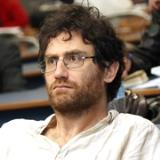Foundations of Quantum Mechanics and Quantum Information Theory
A special issue of Entropy (ISSN 1099-4300). This special issue belongs to the section "Quantum Information".
Deadline for manuscript submissions: closed (31 December 2020) | Viewed by 8013
Special Issue Editors
2. Università degli Studi di Cagliari, I-09123 Cagliari, Italy
Interests: quantum information processing; quantum correlations; uncertainty relations; majorization theory and its applications
Special Issues, Collections and Topics in MDPI journals
Interests: interpretation of quantum mechanics; quantum decoherence; classical limit of quantum mechanics; quantum information theory
Special Issues, Collections and Topics in MDPI journals
Interests: quantum foundations; quantum information; quantum logic; quantum probability
Special Issues, Collections and Topics in MDPI journals
Interests: Quantum Information
Special Issue Information
Dear Colleagues,
From the moment of its inception, quantum theory has posed deep questions with regard to the fundamental problems of physics. During the last few decades, the advent of quantum information theory and the possibility of developing quantum computers have given rise to renewed interest in foundational issues. Research in the foundations of quantum mechanics has particularly been influenced by the development of novel laboratory techniques, allowing for the experimental verification of the most debated aspects of the quantum formalism.
The IX Conference on Quantum Foundations (https://sites.google.com/view/ixjfc/home), to be held in November 27–29, 2019, in Córdoba, Argentina, aims to gather experts in the field to promote academic debate on the foundational problems of quantum theory. This Special Issue captures the main aspects of this debate by incorporating a selected list of contributions presented at the conference. Researchers not attending the conference are also welcome to present their original and recent developments, as well as review papers, on the topics listed below. All contributions will be peer-reviewed.
Topics of the Special Issue:
- Quantum information science
- Quantum statistical mechanics
- Information measures in quantum theory
- Quantum correlations
- Geometrical methods applied to quantum theory
- Violation of bell inequalities
- Quantum probabilities
- Decoherence and classical limit
- Quantum computing
- Interpretations of quantum mechanics
- Quantum contextuality
- Quantum indistinguishability
- Quantum logic
- Algebraic methods in quantum theory
- Hidden variable theories
- Nonlinear methods applied to quantum theory
- Foundations of relativistic quantum mechanics
Dr. Gustavo Martin Bosyk
Dr. Sebastian Fortin
Dr. Federico Holik
Dr. Ana Majtey
Guest Editors
Manuscript Submission Information
Manuscripts should be submitted online at www.mdpi.com by registering and logging in to this website. Once you are registered, click here to go to the submission form. Manuscripts can be submitted until the deadline. All submissions that pass pre-check are peer-reviewed. Accepted papers will be published continuously in the journal (as soon as accepted) and will be listed together on the special issue website. Research articles, review articles as well as short communications are invited. For planned papers, a title and short abstract (about 100 words) can be sent to the Editorial Office for announcement on this website.
Submitted manuscripts should not have been published previously, nor be under consideration for publication elsewhere (except conference proceedings papers). All manuscripts are thoroughly refereed through a single-blind peer-review process. A guide for authors and other relevant information for submission of manuscripts is available on the Instructions for Authors page. Entropy is an international peer-reviewed open access monthly journal published by MDPI.
Please visit the Instructions for Authors page before submitting a manuscript. The Article Processing Charge (APC) for publication in this open access journal is 2600 CHF (Swiss Francs). Submitted papers should be well formatted and use good English. Authors may use MDPI's English editing service prior to publication or during author revisions.







